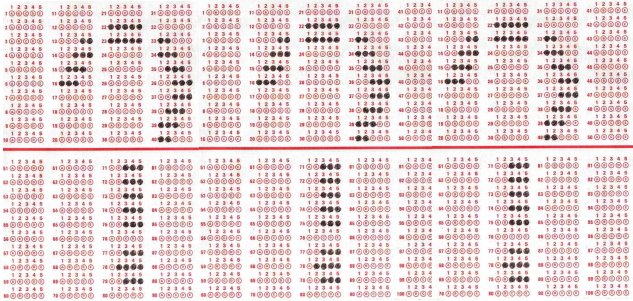Managing Editor Sophie Fernandes has struggled with test anxiety on the Scholastic Aptitude Test (SAT). She believes its content and format disadvantages students with test anxiety and low-income students. Photo illustration by Katy Mayfield.
By SOPHIE FERNANDES – Print Managing Editor
Print Managing Editor Sophie Fernandes has struggled for years with the Scholastic Aptitude Test.
It’s the night before the Scholastic Aptitude Test (SAT) and my anxiety has taken over. I have been practicing coping mechanisms and studying for months, but my mind still races through worst case scenarios.
Testing has always been a weak point for me. Although I study fervently,when I begin the test, much of what I prepared for slips away from memory. I don’t get normal butterflies before a test; if my anxiety is especially bad that day, I shake, can barely breathe and feel like there is a rock in my stomach.
As a senior, it is expected for me to do well on this test, so that I can get into a good college. However, the SAT is not an accurate representation of my, or any student’s intelligence.
The most jarring aspect of the SAT is the little time it give you for each question. The SAT is 180 minutes long: the reading section is 52 questions in 65 minutes, writing is 44 questions in 35 minutes, and math is 58 questions in 80 minutes.
How does the speed at which I’m able to answer something show my proficiency?
As an aspiring journalist, I know that I will not be expected to edit someone’s article in five minutes, so why create such unrealistic times conditions?
Although I have a 3.8 GPA, my SAT scores are not compatible. I have taken the test three times. Each time, when my scores return, I feel extremely disappointed in myself. Even though I keep telling myself that the SAT doesn’t prove my intellectual ability, I still feel judged for it.
The school curriculum generally adheres to one type of learning that is often more beneficial to the system than the student. This concept applies to the SAT, as well. How is it that one test can reflect the ability of many different learning styles? Clarke Central High School College Advisor Alyssa Yuhouse has felt doubtful of the SAT and American College Test (ACT) as well.
“Of course, you have the ‘teaching to the test’, meaning standardized testing, in which case the SAT/ACT definitely falls under. I would not say the SAT/ACT caters to hands-on or visual learners, due to the nature of the test and it being core subjects only. I would not say that the test reflects many different learning styles,” Yuhouse said.
I personally relate to this. I am a visual and kinesthetic learner, which are useful skills, but not as effective for studying for something like the SAT.
However, according to the Washington Post, many colleges such as Colorado College, Agnes Scott College, Colby College and Dickinson College, are already skeptical of the SAT.
“I think that any school in their right mind should be looking at a student holistically. If I am getting a student who has clearly shown through their body of course work that they are a fantastic student, do I think that one test should saddle them? Absolutely not,” CCHS counselor Sam Hicks said.
The College Board needs to revise the SAT in a way that appeals to all students.
